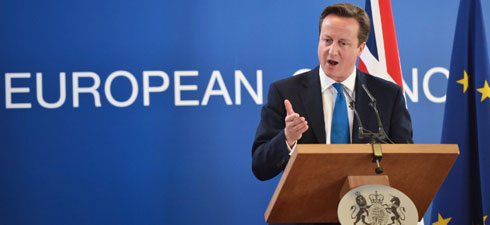**Wednesday’s Commons vote demanding a cut in the EU budget could mark a pivotal moment in this country’s 40-year membership of the institution. While the Government might contend that the decision is non-binding, it is surely politically inconceivable that David Cameron can now agree even to a real-terms freeze in spending when negotiations are held in Brussels this month.
Mr Cameron believes that, with the support of other member states, he can secure a seven-year deal pegging annual cash increases in the EU’s funding to the level of inflation. But that would still mean giving the EU more money; and MPs are clearly weary of being fobbed off with promises of reform tomorrow. At a time when Whitehall departments, councils, hospitals, police forces and the like are all having to make deep cuts, it is unacceptable for the EU not to do the same. Indeed, this should not be a matter for negotiation. The Commons has spoken for a nation that is being required to make sacrifices that the bloated bureaucracy in Brussels refuses to contemplate.
It is, of course, true that the Opposition’s support for the amendment tabled by the Tory MP Mark Reckless calling for a spending cut was utterly cynical. In each of Labour’s 13 years in office, EU spending rose by more than inflation, and a substantial tranche of the country’s hard-won rebate was given away in exchange for reforms to farm subsidies that never materialised. By the time the party left office, Britain’s net contribution had risen by 47 per cent. For Labour now to argue that the EU should reduce its spending in real terms is grotesque opportunism...**
Budget negociations
Europe in a clearance sale
“The result of the current EU budget negotiations will depend on three sensitive issues: the size of the budget, its redistribution and national rebates”, points out Radovan Geist, editor in-chief of the Euractiv.sk, in Pravda. And —
All three hinge on the same question – how much are we willing to pay for our common future? And the second issue appears to be the priority as political leaders tend to think they can get this future at a discount.
One of the most remarkable examples, recalls Geist, is the British rebate negotiated by Mrs Thatcher back in 1984, which will continue to apply during the next seven years even though Britain is “no longer a poor member state” or one of the biggest per capita contributors. Other member countries that also have rebates include Germany, the Netherlands and Sweden: all of which are among the highest contributors in both absolute and per capita terms. Just a few days ago, Denmark – the second highest per capita contributor - asked for a budget rebate. France and Italy – respectively the second and third highest contributors in absolute terms – have not asked for one yet, but are expected to demand compensation in the form of concessions on agricultural and regional policy. And Finland may ask for one too —
European leaders forget that the EU spending is first and foremost an investment in targets set by all member states. [...] Instead of a Europe at a discount, they may end up with a Europe sold off in a stock clearance sale.
Was this article useful? If so we are delighted!
It is freely available because we believe that the right to free and independent information is essential for democracy. But this right is not guaranteed forever, and independence comes at a cost. We need your support in order to continue publishing independent, multilingual news for all Europeans.
Discover our subscription offers and their exclusive benefits and become a member of our community now!












